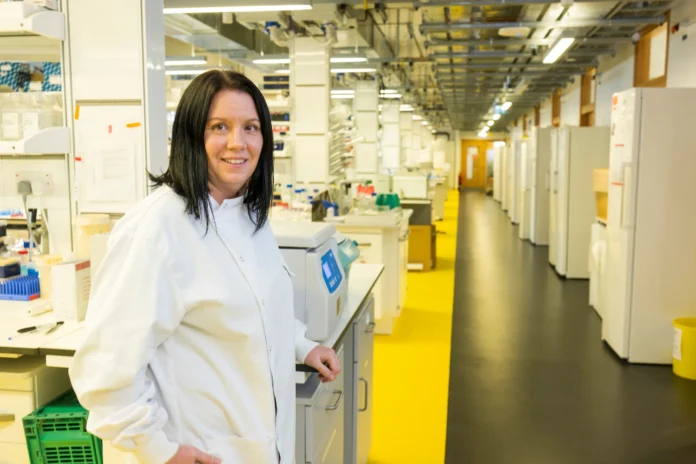Science
Researchers Make Breakthrough in Bowel Cancer Immunotherapy

Researchers at the University of Galway have achieved a significant breakthrough in understanding bowel cancer and its interaction with the immune system. This pioneering study, published in the Journal for ImmunoTherapy of Cancer (JITC), reveals how bowel cancer effectively shuts down the body’s immune response and offers insights into how this can be reversed to enhance treatment options.
Colorectal cancer, commonly known as bowel cancer, ranks among the world’s most prevalent cancers and stands as the second leading cause of cancer-related deaths globally. Alarmingly, diagnoses in individuals under the age of 50 have surged, with recent analyses indicating that early-onset cases have nearly doubled since 1990. In Ireland, over 2,500 individuals are diagnosed with bowel cancer each year.
Professor Aideen Ryan, a leading researcher in tumour immunology at the University of Galway, noted, “While immunotherapy has transformed treatment for cancers such as melanoma and lung cancer, it has shown limited efficacy in bowel cancer. This leaves patients with advanced disease few treatment options and poor survival rates.”
The research team uncovered that tumour stromal cells, which provide structural support for cancer growth, actively reprogram the immune system. These cells do so by deactivating crucial immune components, specifically the natural killer (NK) cells and macrophages, which are essential for combating cancer. Professor Ryan explained, “The cancer creates an immune brake, blocking the body’s natural response and defence mechanisms.”
This study identified specific enzymes responsible for producing Siglec-binding sugars on stromal cells. These sugars interact with receptors on immune cells, effectively switching off the body’s defence mechanisms when immunotherapy is employed. The researchers demonstrated that by inhibiting this pathway using drugs known as sialidases, they could reactivate NK cells and macrophages, leading to tumour shrinkage and prevention of metastasis.
Collaboration and Insights
The multidisciplinary research involved collaboration with colorectal surgeons and pathologists at Galway University Hospital, led by Professors Aisling Hogan and Sean Hynes. Additionally, experts from Queen’s University Belfast and Palleon Pharmaceuticals in the United States contributed to the study. This collaboration has fostered advancements in targeting sialoglycans, which play a pivotal role in the immune response to cancer.
Professor Ryan emphasized the significance of these findings, stating, “This breakthrough enhances our understanding of bowel cancer and the mechanisms that may allow immunotherapy to be more effective. We have uncovered an entirely new checkpoint that could reactivate the immune system to fight the disease.”
Michael O’Dwyer, Professor of Medicine and Scientific Director of the University of Galway Cancer Centre, remarked on the study’s implications, highlighting the intricate interplay between tumour cells and the immune system that facilitates cancer progression.
Dr. Jim Broderick, CEO and Founder of Palleon Pharmaceuticals, acknowledged the importance of this research, stating, “Targeting the sialoglycan biology offers substantial potential for developing new therapies for diseases characterized by immune dysfunction, including cancer.”
Public Engagement and Awareness
To further promote awareness of this groundbreaking work, Professor Ryan’s research is featured in the Breakthrough Cancer Research exhibition titled Cancer Revolution: Science, Innovation and Hope, located in Stephen’s Green Shopping Centre until October 31, 2023. The exhibition showcases striking microscopy images of stromal cells interacting with tumours and includes a 3D model of a tumour, illustrating how these cells impede the immune system in bowel cancer.
This research not only sheds light on the mechanisms behind bowel cancer but also instills hope for patients battling this challenging disease, suggesting that future immunotherapies could be more effective in reactivating the body’s innate ability to fight cancer and prevent its spread.
-

 Top Stories1 month ago
Top Stories1 month agoTributes Surge for 9-Year-Old Leon Briody After Cancer Battle
-

 Entertainment3 months ago
Entertainment3 months agoAimee Osbourne Joins Family for Emotional Tribute to Ozzy
-

 Politics3 months ago
Politics3 months agoDanny Healy-Rae Considers Complaint After Altercation with Garda
-

 Top Stories2 months ago
Top Stories2 months agoIreland Enjoys Summer Heat as Hurricane Erin Approaches Atlantic
-

 World3 months ago
World3 months agoHawaii Commemorates 80 Years Since Hiroshima Bombing with Ceremony
-

 Top Stories3 months ago
Top Stories3 months agoFianna Fáil TDs Urgently Consider Maire Geoghegan-Quinn for Presidency
-

 Top Stories1 month ago
Top Stories1 month agoNewcastle West Woman Patricia Foley Found Safe After Urgent Search
-

 World3 months ago
World3 months agoGaza Aid Distribution Tragedy: 20 Killed Amid Ongoing Violence
-

 World3 months ago
World3 months agoCouple Convicted of Murdering Two-Year-Old Grandson in Wales
-

 Top Stories3 months ago
Top Stories3 months agoHike Donegal’s Errigal Mountain NOW for Unforgettable Summer Views
-

 Top Stories3 months ago
Top Stories3 months agoClimbing Errigal: A Must-Do Summer Adventure in Donegal
-

 World3 months ago
World3 months agoAristocrat Constance Marten and Partner Convicted of Infant Murder









